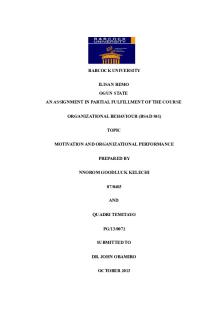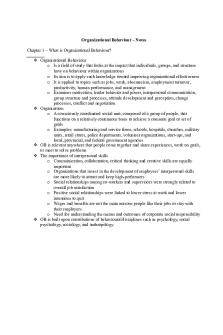Organizational theory and behaviour PDF

| Title | Organizational theory and behaviour |
|---|---|
| Author | Anonymous User |
| Course | Organizational Theory and Behavior |
| Institution | University of the People |
| Pages | 186 |
| File Size | 4.3 MB |
| File Type | |
| Total Downloads | 73 |
| Total Views | 163 |
Summary
Download Organizational theory and behaviour PDF
Description
ORGANIZATIONAL THEORY AND BEHAVIOUR STUDY MATERIAL MASTER OF COMMERCE Paper MC1C5
2015 Admission
UNIVERSITY OF CALICUT SCHOOL OF DISTANCE EDUCATION CALICUT UNIVERSITY P.O., THENJIPALAM, MALAPPURAM-673635
2025
School of Distance Education
UNIVERSITY OF CALICUT SCHOOL OF DISTANCE EDUCATION STUDY MATERIAL I M.COM ORGANISATIONAL THEORY AND BEHAVIOUR
PREPARED BY BAIJUMON.P ASSITANT PROFESSOR PG DEPARTMENT OF COMMERCE GOVT. COLLEGE MALAPPURAM SCRUTINISED BY
DR. YAKOOB . C. READER AND RESEARCH GUIDE, SS COLLEGE, AREACODE. Settings & Lay out: Computer Section, SDE © Reserved
Organizational Theory and behaviour
Page 2
School of Distance Education
MODULE I
Name of Chapter
Page No.
1
INTRODUCTION TO ORGANISATIONALBEHAVIOUR
5
2
NATURE AND SCOPE (FEATURES) OF ORGANIZATIONAL BEHAVIOUR
8
3
ORGANISATION AS A SYSTEM
15
4
MANAGERIAL FUNCTIONS
19
5
BASIC PSYCHOLOGICAL PROCESS-PERCEPTION
23
6
ATTRIBUTION IN ORGANIZATIONS
28
7
LEARNING
30
8
IMPLICATIONS FOR PERFORMANCE AND SATISFACTION
36
9
MOTIVATIONAL CONCEPTS.
38
10
THEORIES OF MOTIVATION
42
11
PERSONALITY
64
12
PERSONALITY THEORIES
70
13
MAJOR PERSONALITY ATTRIBUTES INFLUENCING ORGANISATION BEHAVIOUR
73
14
ATTITUDES
76
15
ETHICAL ISSUES IN ORGANISATIONAL BEHAVIOUR
82
16
ROLE OF COUNSELING
86
17
GROUP DYNAMICS AND INTER GROUP RELATIONSHIPS
91
18
GROUP DYNAMICS
99
19
TEAM MANAGEMENT - MEANING AND CONCEPT
108
20
LEADERSHIP AND COMMUNICATION
114
22
RECENT APPRAOCHES TO LEADERSHIP THEORIES
131
23
COMMUNICATION
134
24
POWER AND POLITICS IN ORGANISATIONS
145
25
MANAGING CHANGE
158
26
ORGANISATIONAL DEVELOPMENT
173
27
TRANSACTIONAL ANALYSIS
180
21
Organizational Theory and behaviour
Page 3
School of Distance Education
Organizational Theory and behaviour
Page 4
School of Distance Education
MODULE 1 UNIT 1 INTRODUCTION TO ORGANISATIONALBEHAVIOUR The success of every organisation depends upon the efficiency and effectiveness of the management and the effectiveness of the management depends primarily on its human skills and how well it understands the needs and desires of the people .Organisational behaviour actually refers to the behaviour of the people in the organisations because organisations themselves do not behave .It is an accepted fact that an organisation can develop only when its people are developed. Organisational behaviour is a field of study that investigates the impact that individuals, group and structure have on behaviour within organisations. It covers three determinants of behaviour within organisations – individuals , group and structure. It is an applied field because it applies the knowledge gained about individuals, and the effect of structure on behaviour, in order to make organisations work more effectively. Organisational behaviour is an academic discipline concerned with describing, understanding, predicting and controlling human behaviour in an organisational environment. The importance & scope of Organisational Behaviour & their study is growing rapidly due to changing cultural, ethical and business environment of Organization. Manager should concentrate on employee•s nature, reaction and response to different situations of organization which are becoming an important part in today•s scenario. The present day changing conditions like fast paced organisational change, fast changing technology, shorter life cycles for products work force diversity, declining loyalty, skill deficiencies increased demand for flexibility, continuous improving quality of people in organisations. Organisations have been described as groups of people who interact to accomplish shared objectives. The study of organisational behaviour and its connected subjects help us to understand what people think, feel and do in organisational settings. Organizational behaviour is the study of how people behave both individually and within informal and formal groups. Every organization•s performance is ultimately dependent on the motivational levels of its human resources and the willingness and ability of people to work harmoniously and effectively towards the accomplishment of shared goals. In this discipline, we will explore and examine the interrelationships of individual personality and work, the characteristics of organizations and their environments and the challenges presented by the ever-changing combination of these factors. Organizational Behaviour helps to understand different activities and actions of people in organization. It also helps to motivate them. People, Environment, Technology and structure are the main four elements of organizational behaviour. Simply the scope of this mix is the scope of Organisational Behaviour. DEFINITION OF ORGANIZATIONAL BEHAVIOUR (O.B.) ” Organizational Behaviour is the study of human behaviour in the workplace, the interaction between people and the organization, and the organization itself.” Keith Davis and John Newstrom (1985) has defined O.B. as "the study and application of knowledge how people act or behave within organization. It is a human tool for human benefit. It applies broadly to the behaviour of people in all types of organizations such as business, government, schools and service organizations." In the opinion of Robbins, "O.B. is a field of study that investigates the impact that individuals, groups and structure have on behaviour within organizations for the purpose of applying such knowledge towards improving an organization's effectiveness". Organizational Theory and behaviour
Page 5
School of Distance Education The above definitions are comprehensive ones as these contain all characteristics of O.B. In brief, what O.B. studies are three determinants of behaviour in organizations individuals, groups and structure. Organizational behaviour in the words of Keith Davis may be defined as - "Organizational behaviour is the study and application of knowledge about human behaviour in organizations as it relates to other system elements, such as structure, technology and the external social system. To sum up, O.B. is concerned with the study of how and what people act in organizations and also how their acts affect the performance of the organization. It also applies the knowledge gained about individuals, groups and the effect of structure on human behaviour in order to make organizations work more effectively. Organizational behaviour is a field of study that investigates the impact that individuals, groups and structure have on behaviour within organizations, for the purpose of applying such knowledge toward improving an organization's effectiveness. An organization is a collection of people who work together to achieve a wide variety of goals, both goals of the various individuals in the organization and goals of the organization as a whole. Organizations exist to provide goods and services that people want. These goods and services are the products of the behaviours of workers. Organizational behaviour is the study of the many factors that have an impact on how individuals and groups respond to and act in organizations and how organizations manage their environments. Although many people assume that understanding human behaviour in organizations is intuitive, many commonly held beliefs about behaviour in organizations, such as the idea that a "happy worker is a productive worker," are either entirely false or true only in specific situations. The study of organizational behaviour provides a set of tools —concepts and theories—that help people understand, analyze and describe what goes on in organizations and why. How do the characteristics of individuals, groups, work situations and the organization itself affect how members feel about their organization? The ability to use the tools of organizational behaviour to understand behaviour in organizations is one reason for studying this subject. A second reason is to learn how to apply these concepts, theories and techniques to improve behaviour in organizations so that individuals, groups and organizations can achieve their goals. Managers are challenged to find new ways to motivate and coordinate employees to ensure that their goals are aligned with organizational goals. HISTORY OF ORGANIZATIONAL STUDY The Greek philosopher Plato wrote about the essence of leadership. Aristotle addressed the topic of persuasive communication. The writings of 16th century Italian philosopher Niccolo Machiavelli laid the foundation for contemporary work on organizational power and politics. In 1776, Adam Smith advocated a new form of organizational structure based on the division of labour. One hundred years later, German sociologist Max Weber wrote about rational organizations and initiated discussion of charismatic leadership. Soon after, Frederick Winslow Taylor introduced the systematic use of goal setting and rewards to motivate employees. In the 1920s, Australian-born Harvard professor Elton Mayo and his colleagues conducted productivity studies at Western Electric's Hawthorne plant in the United States. Though it traces its roots back to Max Weber and earlier, organizational studies is generally considered to have begun as an academic discipline with the advent of scientific management in the 1890s, with Taylorism representing the peak of this movement. Proponents of scientific management held that rationalizing the organization with precise sets of instructions and timemotion studies would lead to increased productivity. Studies of different compensation systems were carried out. Organizational Theory and behaviour
Page 6
School of Distance Education After the First World War, the focus of organizational studies shifted to analysis of how human factors and psychology affected organizations, a transformation propelled by the identification of the Hawthorne Effect. This Human Relations Movement focused on teams, motivation and the actualization of the goals of individuals within organizations. The Second World War further shifted the field, as the invention of large-scale logistics and operations research led to a renewed interest in rationalist approaches to the study of organizations. Interest grew in theory and methods native to the sciences, including systems theory, the study of organizations with a complexity theory perspective and complexity strategy. Influential work was done by Herbert Alexander Simon and James G. March and the so-called "Carnegie School" of organizational behaviour. In the 1960s and 1970s, the field was strongly influenced by social psychology and the emphasis in academic study was on quantitative research. An explosion of theorizing, much of it at Stanford University and Carnegie Mellon, produced Bounded Rationality, Informal Organization, Contingency Theory, Resource Dependence, Institutional Theory and Organizational Ecology theories, among many others. Starting in the 1980s, cultural explanations of organizations and change became an important part of study. Qualitative methods of study became more acceptable, informed by anthropology, psychology and sociology. A leading scholar was Karl Weick. Specific Contributions Frederick Winslow Taylor (1856-1915) was the first person who attempted to study human behavior at work using a systematic approach. Taylor studied human characteristics, social environment, task, physical environment, capacity, speed, durability, cost and their interaction with each other. His overall objective was to reduce and/or remove human variability. Taylor worked to achieve his goal of making work behaviors stable and predictable so that maximum output could be achieved. He relied strongly upon monetary incentive systems, believing that humans are primarily motivated by money. He faced some strong criticism, including being accused of telling managers to treat workers as machines without minds, but his work was very productive and laid many foundation principles for modern management study. Mary Parker Follett was a pioneer management consultant in the industrial world. As a writer, she provided analyses on workers as having complex combinations of attitude, beliefs and needs. She told managers to motivate employees on their job performance, a "pull" rather than a "push" strategy. Douglas McGregor proposed two theories/assumptions, which are very nearly the opposite of each other, about human nature based on his experience as a management consultant. His first theory was "Theory X", which is pessimistic and negative; and according to McGregor it is how managers traditionally perceive their workers. Then, in order to help managers replace that theory/assumption, he gave "Theory Y" which takes a more modern and positive approach. He believed that managers could achieve more if they start perceiving their employees as selfenergized, committed, responsible and creative beings. By means of his Theory Y, he in fact challenged the traditional theorists to adopt a developmental approach to their employees. He also wrote a book, 'The Human Side of Enterprise', in 1960; this book has become a foundation for the modern view of employees at work. Organizational behaviour is currently a growing field. Organizational studies departments generally form part of business schools, although many universities also have industrial psychology and industrial economics programs.
Organizational Theory and behaviour
Page 7
School of Distance Education UNIT 2 NATURE AND SCOPE (FEATURES) OF ORGANIZATIONAL BEHAVIOUR Organizational behaviour has emerged as a separate field of study. The nature it has acquired is identified as follows: 1. A Separate Field of Study and not a Discipline Only By definition, a discipline is an accepted science that is based on a theoretical foundation. But, O.B. has a multi-interdisciplinary orientation and is, thus, not based on a specific theoretical background. Therefore, it is better reasonable to call O.B. a separate field of study rather than a discipline only. 2. An Interdisciplinary Approach Organizational behaviour is essentially an interdisciplinary approach to study human behaviour at work. It tries to integrate the relevant knowledge drawn from related disciplines like psychology, sociology and anthropology to make them applicable for studying and analysing organizational behaviour. 3. An Applied Science The very nature of O.B. is applied. What O.B. basically does is the application of various researches to solve the organizational problems related to human behaviour. The basic line of difference between pure science and O.B. is that while the former concentrates of fundamental researches, the latter concentrates on applied researches. O.B. involves both applied research and its application in organizational analysis. Hence, O.B. can be called both science as well as art. 4. A Normative Science Organizational Behaviour is a normative science also. While the positive science discusses only cause effect relationship, O.B. prescribes how the findings of applied researches can be applied to socially accepted organizational goals. Thus, O.B. deals with what is accepted by individuals and society engaged in an organization. 5. A Humanistic and Optimistic Approach Organizational Behaviour applies humanistic approach towards people working in the organization. It deals with the thinking and feeling of human beings. O.B. is based on the belief that people have an innate desire to be independent, creative and productive. It also realizes that people working in the organization can and will actualize these potentials if they are given proper conditions and environment. Environment affects performance or workers working in an organization. 6. A Total System Approach The system approach is one that integrates all the variables, affecting organizational functioning. The systems approach has been developed by the behavioural scientists to analyse human behaviour in view of his/her socio-psychological framework. Man's socio-psychological framework makes man a complex one and the systems approach tries to study his/her complexity and find solution to it. SCOPE OF ORGANIZATIONAL BEHAVIOUR The three internal organizational elements viz., people, technology and structure and the fourth element, i.e., external social systems may be taken as the scope of O.B.
Organizational Theory and behaviour
Page 8
School of Distance Education 1. People The people constitute the internal social system of the organization. They consist of individuals and groups. Groups may be large or small, formal or informal, official or unofficial. They are dynamic. They form, change and disband. Human organization changes everyday. Today, it is not the same as it was yesterday. It may change further in the coming days. People are living, thinking and feeling being who created the organization and try to achieve the objectives and goals. Thus, organizations exist to serve the people and not the people exist to serve the organization. Organizations are the associations of individuals. Individuals differ in many respects. The study of individuals, therefore, includes aspects such as personality, perception, attitudes, values, job satisfaction, learning and motivation 2. Structure Structure defines the sole relationship of people in an organization. Different people in an organization are given different roles and they have certain relationship with others. It leads to division of labour so that people can perform their duties or work to accomplish the organizational goal. Thus, everybody cannot be an accountant or a clerk. Work is complex and different duties are to be performed by different people. Some may be accountant; others may be managers, clerks, peons or workers. All are so related to each other to accomplish the goal in a co-ordinated manner. Thus, structure relates to power and duties. One has the authority and others have a duty to obey him. 3. Technology Technology imparts the physical and economic conditions within which people work. With their bare hands people can do nothing so they are given assistance of buildings, machines, tools, processes and resources. The nature of technology depends very much on the nature of the organization and influences the work or working conditions. Thus, technology brings effectiveness and at the same restricts people in various ways. 4. Social System Social system provides external environment which the organization operates. A single organization cannot exist also. It is a part of the whole. One organization cannot give everything and therefore, there are many other organizations. All these organizations influence each other. It influences the attitudes of people, their working conditions and above all provides competition for resources and power. O.B. is the study of human behaviour at work in organizations. Accordingly, the scope of O.B. includes the study of individuals, groups and organization/structure. Let us briefly reflect on what aspects each of these three cover. NEED FOR THE KNOWLEDGE OF OB • Organizational behavior studies the factors that impact individual and group behavior in organizations and how orga...
Similar Free PDFs
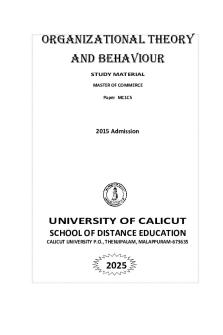
Organizational theory and behaviour
- 186 Pages
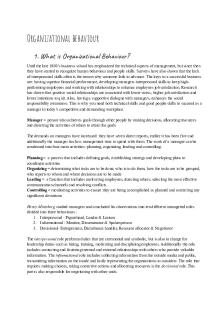
Organizational behaviour
- 67 Pages

Organizational Behaviour
- 2 Pages
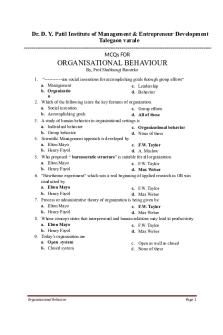
Organizational Behaviour mcqs
- 27 Pages
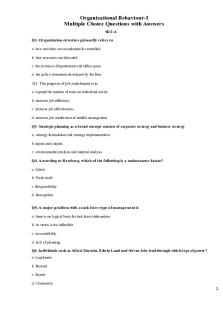
Organizational Behaviour MCQ SET
- 20 Pages
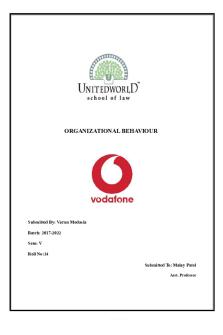
Organizational Behaviour Project
- 15 Pages

Chapter 2 ORGANIZATIONAL BEHAVIOUR
- 23 Pages

Organizational Behaviour Glossary
- 17 Pages
Popular Institutions
- Tinajero National High School - Annex
- Politeknik Caltex Riau
- Yokohama City University
- SGT University
- University of Al-Qadisiyah
- Divine Word College of Vigan
- Techniek College Rotterdam
- Universidade de Santiago
- Universiti Teknologi MARA Cawangan Johor Kampus Pasir Gudang
- Poltekkes Kemenkes Yogyakarta
- Baguio City National High School
- Colegio san marcos
- preparatoria uno
- Centro de Bachillerato Tecnológico Industrial y de Servicios No. 107
- Dalian Maritime University
- Quang Trung Secondary School
- Colegio Tecnológico en Informática
- Corporación Regional de Educación Superior
- Grupo CEDVA
- Dar Al Uloom University
- Centro de Estudios Preuniversitarios de la Universidad Nacional de Ingeniería
- 上智大学
- Aakash International School, Nuna Majara
- San Felipe Neri Catholic School
- Kang Chiao International School - New Taipei City
- Misamis Occidental National High School
- Institución Educativa Escuela Normal Juan Ladrilleros
- Kolehiyo ng Pantukan
- Batanes State College
- Instituto Continental
- Sekolah Menengah Kejuruan Kesehatan Kaltara (Tarakan)
- Colegio de La Inmaculada Concepcion - Cebu

